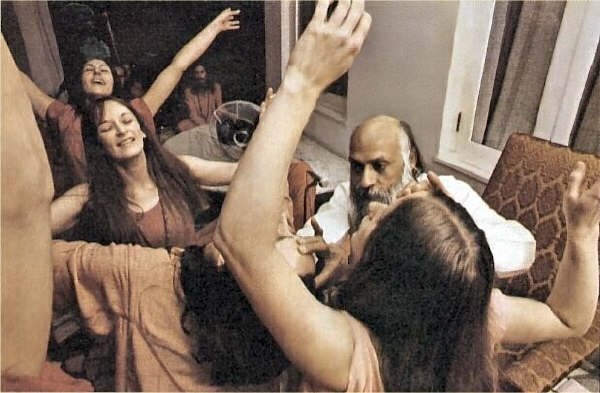A sad child means an ill child, and a laughing old man means he is still young. Even death cannot make him old, nothing can make him old. His energy is still flowing and overflowing, he is always flooded. Laughter is a flooding of energy.
In Zen monasteries they have been laughing and laughing and laughing. Laughter becomes prayer only in Zen, because Mahakashyap started it. Twenty-five centuries ago, on a morning just like this, Mahakashyap started a new trend, absolutely new, unknown to the religious mind before — he laughed. He laughed at the whole foolishness, the whole stupidity.
And Buddha didn't condemn; rather, on the contrary, he called him near, gave him the flower and spoke to the crowd. And when the crowd heard the laughter they must have thought, "This man has gone mad. This man is disrespectful to Buddha, because how can you laugh before a Buddha? When a Buddha is sitting silently, how can you laugh? This man is not paying respect."
The mind will say that this is disrespect. The mind has its own rules, but the heart does not know them; the heart has its own rules, but the mind has never heard about them. The heart can laugh and be respectful; the mind cannot laugh, it can only be sad and then be respectful. But what kind of respect is this which cannot laugh? A very new trend entered with Mahakashyap's laughter, and down the centuries the laughter has continued. Only Zen masters, Zen disciples, laugh.
All over the world, all religions have become ill because sadness has become so prominent. And temples and churches look like graveyards; they don't look festive, they don't give a sense of celebration. If you enter a church what do you see there? Not life, but death — Jesus crucified on the cross completes the whole sadness there. Can you laugh in a church, dance in a church, sing in a church?
Yes, singing is there, but that is sad, and people sit with long faces. No wonder nobody wants to go to church — it's just a social duty to be fulfilled; no wonder nobody is attracted to the church — it is a formality. Religion has become a Sunday thing.
For one hour you can tolerate being sad. Mahakashyap laughed before Buddha, and since then, saints, monks, sannyasins, masters, have been doing such things which religious minds — so-called religious minds — cannot even conceive of.
If you have seen any Zen book you may have seen Zen masters depicted, painted. No painting is true. If you look at Bodhidharma's painting or Mahakashyap's painting, they are not true to their faces, but just looking at them you will have a feeling of laughter. They are hilarious, they are ridiculous.
Look at Bodhidharma's painting. He must have been one of the most beautiful men; that he was otherwise is not possible, because whenever a man becomes enlightened a beauty descends, a beauty which comes from the beyond.
A blessing comes to his whole being. But look at Bodhidharma's painting. He looks ferocious and dangerous. He looks so dangerous that you will become scared if he comes to visit you in the night — never again in your life will you be able to sleep. He looks so dangerous, as if he is going to kill you. It was just disciples laughing at the master, creating a ridiculous portrait. It looks like a cartoon.
All Zen masters are depicted in a ridiculous way. Disciples enjoy it. But those portraits carry a quality that Bodhidharma is dangerous, that if you go to him he will kill you, that you cannot escape him, that he will follow you and haunt you, that wherever you go he will be there, that unless he kills you he cannot leave you. That is the thing depicted with all Zen masters, even Buddha.
If you look at Japanese and Chinese paintings of Buddha, they don't look like the Indian Buddha. They have changed him totally. If you look at Indian paintings of Buddha, his body is proportionate, as it should be. He was a prince, then a buddha, a beautiful man, perfect, proportionate. A big-bellied Buddha? — he never had a big belly.
But in Japan, in his paintings, his scriptures, he is painted with a big belly, because a man who laughs must have a big belly. Belly laughter — how can you do it with a small belly? You cannot do it. They are joking with Buddha, and they have said such things about Buddha — only very deep love can do that, otherwise it looks insulting.
Bankei always insisted on having a painting of Buddha just behind him, and talking to his disciples he would say, "Look at this fellow. Whenever you meet him kill him immediately, don't give him a chance. While meditating he will come to disturb you.
Whenever you see his face in meditation, just kill him then and there; otherwise he will follow you." And he used to say, "Look at this fellow! if you repeat his name" — because Buddhists go on repeating, NAMO BUDDHAYA, NAMO BUDDHAYA — "if you repeat his name, then go and wash your mouth." It looks insulting. It is Buddha's name and this man says, "If you repeat it, the first thing to do is wash your mouth. Your mouth has become dirty."
And he is right — because words are words; whether it is the name of Buddha or not makes no difference. Whenever a word crosses your mind, your mind has become dirty. Wash out even Buddha's name. And this man, keeping the portrait of Buddha always behind him, would bow down to it every morning. So his disciples asked, "What are you doing? You go on telling us: Kill this man, don't allow him to stand in the way. And you say: Don't take his name, don't repeat it; if it comes wash your mouth. And now we see you bowing down."
So Bankei said, "All this has been taught to me by this man, this fellow, so I have to pay respect."
Mahakashyap laughed, and this laughter carried many dimensions in it. One dimension was at the foolishness of the whole situation, at a buddha silent and nobody understanding him, everybody expecting him to speak.
His whole life Buddha had been saying that the truth cannot be spoken, and still everybody expected him to speak. The second dimension — he laughed at Buddha also, at the whole dramatic situation he had created, sitting there with a flower in his hand, looking at the flower, creating so much uneasiness, restlessness in everybody. At this dramatic gesture of buddha he laughed and he laughed.
The third dimension — he laughed at his own self. Why couldn't he understand up to now? The whole thing was easy and simple. And the day you understand, you will laugh, because there is nothing to be understood. There is no difficulty to be solved. Everything has always been simple and clear. How could you miss it?
With Buddha sitting silent, the birds singing in the trees, the breeze passing through the trees, and everybody restless, Mahakashyap understood. What did he understand? He understood that there is nothing to be understood, there is nothing to be said, there is nothing to be explained. The whole situation is simple and transparent. Nothing is hidden in it. There is no need to search, because all that is, is here and now, within you. He laughed at his own self also, at the whole absurd effort of many lives just to understand this silence — at so much thinking.
Buddha called him, gave him the flower and said, "Hereby, I give you the key." What is the key? Silence and laughter is the key — silence within, laughter without. And when laughter comes out of silence, it is not of this world, it is divine.
When laughter comes out of thinking it is ugly; it belongs to this ordinary, mundane world, it is not cosmic. Then you are laughing at somebody else, at somebody else's cost, and it's ugly and violent.
When laughter comes out of silence you are not laughing at anybody's cost, you are simply laughing at the whole cosmic joke. And it really is a joke!
That's why I go on telling jokes to you… because jokes carry more than any scriptures. It is a joke because inside you you have everything, and you are searching everywhere. What else should a joke be? You are a king and acting like a beggar in the streets; not only acting, not only deceiving others, but deceiving yourself that you are a beggar.
You have the source of all knowledge and are asking questions; you have the knowing self and think that you are ignorant; you have the deathless within you and are afraid and fearful of death and disease. This really is a joke, and if Mahakashyap laughed, he did well.
But except for Buddha, nobody understood. He accepted the laughter and immediately realized that Mahakashyap had attained. The quality of that laugh was cosmic. He understood the whole joke of the situation. There was nothing else to it.
The whole thing is as if the divine is playing hide-and-seek with you. Others thought Mahakashyap was a fool, laughing in front of Buddha. But Buddha thought this man had become wise. Fools always have a subtle wisdom in them, and the wise always act like fools.
OSHO


